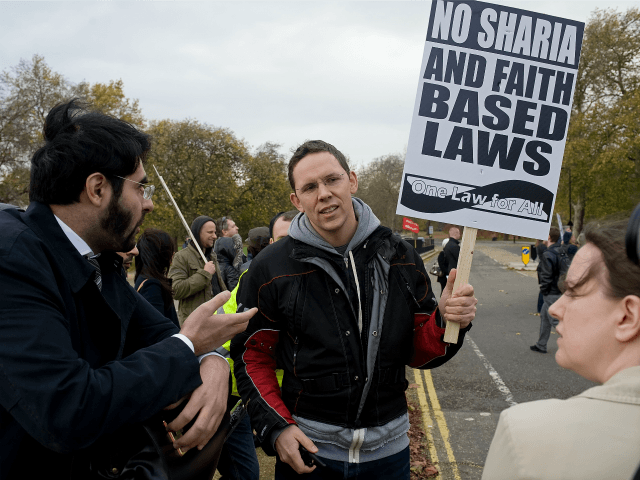As part of the UK government’s Counter-Extremism Strategy, the details of an independent review of the application of Sharia Law in England and Wales have been announced.
As Breitbart London reported last October, an independent review of Sharia Law was announced by the then Parliamentary Under Secretary of State for Criminal Information, Lord Bates. Sharia is the Islamic legal system, derived from the Quran and the Hadith, which is a significant source of legislation in many Muslim countries.
Responding to a written question from the Bishop of St Albans, Lord Bates said: “Sharia councils may be working in a discriminatory and unacceptable way.
“That is why, as part of the forthcoming counter-extremism strategy, [the] Government will commission a full, independent investigation to assess to what extent Sharia is being applied in a manner that is unacceptable.”
Lord Bates concluded his comments saying: “We will act on any evidence of its application which is outside of the law.”
The terms of reference of the Sharia review were revealed this morning by the Home Office. In a statement which announced the review, expected to complete in 2017, it said it would “seek out examples of best practice among Sharia councils.” There are an estimated 30 such councils in the UK, giving Islamic divorce certificates and advice on diverse aspects of religious law.
The Home Office stated that there is “evidence some Sharia councils may be working in a discriminatory and unacceptable way, seeking to legitimise forced marriage and issuing divorces that are unfair to women,” something which the government department declares is “contrary to the teachings of Islam.”
Although welcoming the review, the campaigns director for the National Secular Society, Stephen Evans, criticised the Government for proclaiming what was “contrary to the teachings of Islam.” He said:
“Whether this claim has any truth whatsoever or not, the Government has no place opining on the ‘true’ meaning of any religion.
“The State’s interests here are in ensuring that British law is not being undermined, that all citizens, particularly women, are able to access their legal and civil rights, and that there truly is one law for all in our country.
“We urge the Government to recognise that no matter how compliant some may be with Human Rights standards, the flourishing of Sharia councils can only undermine notions of common citizenship.
“It must also be acknowledged that as long as long as such forums exist, minorities within minorities and vulnerable groups, especially women, will face pressure from within their community to settle matters in religious ‘courts’, rather than in a secular legal setting.”
The terms of reference set by the review state that it will: “explore whether, and to what extent, the application of Sharia law may be incompatible with the law in England and Wales. It will examine the ways in which Sharia may be being misused, or exploited, in a way that may discriminate against certain groups, undermine shared values and cause social harms.”
Announcing the review, which will be chaired by Professor Mona Siddiqui, Home Secretary Theresa May said:
“A number of women have reportedly been victims of what appear to be discriminatory decisions taken by Sharia councils, and that is a significant concern. There is only one rule of law in our country, which provides rights and security for every citizen.
“Professor Siddiqui, supported by a panel with a strong balance of academic, religious and legal expertise, will help us better understand whether and the extent to which Sharia law is being misused or exploited and make recommendations to the government on how to address this.”
Working alongside Professor Siddiqui, herself an expert in Islamic and Interreligious studies, are family law barrister Sam Momtaz, retired high court judge Sir Mark Hedley and specialist family law lawyer Anne Marie Hutchinson OBE QC.
They will be informed by two religious and theological specialists — Imam Sayed Ali Abbas Razawi and Imam Qari Asim — who the Home Office says “will ensure the panel has a full and thorough understanding of the religious and theological issues relating to specific aspects of Sharia Law, and the way it is applied.”
Meanwhile Dr Ronan McCrea — a law lecturer at University College London who specialisis in the relationship between law and religion in liberal democracies — has argued that letting religious courts make rulings on family matters, even if apparently compliant with human rights law, is “flawed”. He also warned that tribunals like Sharia ‘courts’ cheapen citizenship and risk “undermining the sustainability of multi-ethnic societies.”
Dr McCrea said that even where the use of Sharia Law is ostensibly voluntary, “it is likely that some women or LGBT individuals (whose interests are unlikely to be favourably treated by religious courts), will be pressurised into using religious tribunals when they would prefer not to.”
In addition, he said members of religious minorities are forced to endure “emotional and social costs which are not imposed on their fellow citizens” if they try to access secular courts.
In his paper published in Public Law, Dr McCrea noted that “encouraging disengagement” from the common legal system may result in a “balkanised” society leaving women and other vulnerable groups at the mercy of “reactionary religious bodies”.

COMMENTS
Please let us know if you're having issues with commenting.